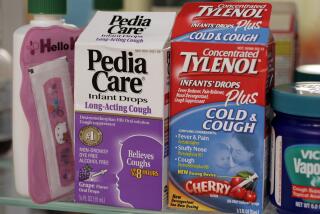Will Your Medicine Cabinet Save Your Life?
- Share via
We have earthquake preparedness kits, smoke alarms and escape ladders. But what should we have in the house when a catastrophe doesn’t strike? What medical items should always be handy to treat everything from hand cuts to upset stomach?
We went to the experts and they developed two lists of medical products that every home must have or ought to have:
The top 10 medical must-haves
* Two kinds of pain relievers: acetaminophen (such as Tylenol) and either aspirin or ibuprofen.
* Antihistamine to treat allergies and allergic reactions.
* Thermometer (and rubbing alcohol to sanitize).
* Tweezers to remove splinters.
* Hydrogen peroxide to clean cuts and scrapes; an antibacterial ointment to apply to a wound before you dress it.
* Gauze and adhesive bandages to clean and dress cuts and scrapes; butterfly bandages are useful to close minor cuts.
* Saline solution to use as an eye rinse.
* Syrup of ipecac to induce vomiting.
* Antacid to treat nausea and heartburn
* Bulb syringe to clear nose and mouth.
What the docs say you oughta have
Herbal Treatments:
(If you’re on prescription medications, consult a physician before taking herbal treatments.)
* Echinacea for treatment of cold / flu symptoms.
* Valerian to induce sleep.
* Melatonin to help restore the body’s clock; used to eliminate jet lag.
* Licorice root to ease cough and sore throat.
* Chamomile to alleviate digestive troubles.
* Feverfew to ease symptoms of migraine headaches, nausea and vomiting.
Vitamins:
(Note: It’s easy to go overboard here, and dosages depend on your dietary needs, but these are the essential vitamins. Consult your physician if in doubt.)
* Vitamin A
* Vitamin B complex
* Vitamin C
* Vitamin E
For the elderly:
* At least a two-week supply of critical medication in case of emergency.
* Ointment for osteoarthritis and rheumatoid arthritis.
* Castor oil for bursitis.
* CPR pocket reminder for use in case of a heart attack.
For infants, children:
* Digital thermometer.
* Liquid antibacterial soap (because babies can choke on bar soap).
* Clear pediolite to aid in rehydration.
* Apple juice (warm) to treat a sore throat.
Odds and ends:
* Deep-heating rubs such as BenGay
* Ace bandages
* Ice packs
* Witch hazel
* Cotton balls
* Hot water bottle
* Sun block
* Baking soda for bee stings, itching, athlete’s foot fungus and sunburn
* Tea with honey for laryngitis
* Aloe plant for sunburn and other burns
* Petroleum jelly for chafing and cold sores
* Oil of cloves for toothaches
* The oil from Vitamin E capsules to minimize scarring
* Flashlight
See S6 for sources
Sources
Sources of information for “Medical Must-Haves” and “Oughta-Haves” on S1: UCLA Family Health Center; UCLA’s Department of East-West Medicine; Dr. Ralph Yep, physician in charge of continuing care services for Kaiser-Metro Member Services Area, West Los Angeles; Children’s Hospital of Orange County; “The Doctors Book of Home Remedies” by the Editors of Prevention Magazine Health Books (Rodale Press, 1990)






